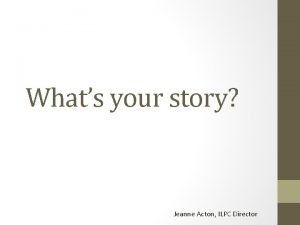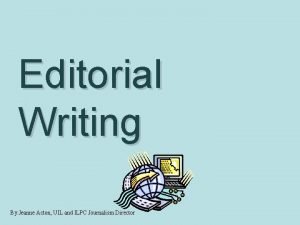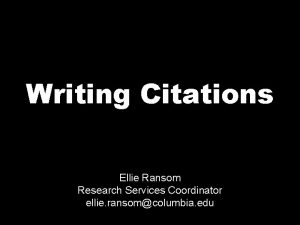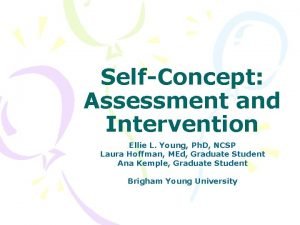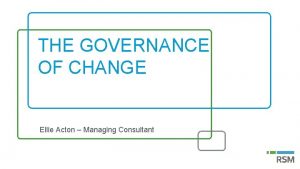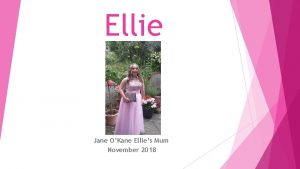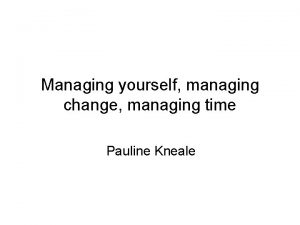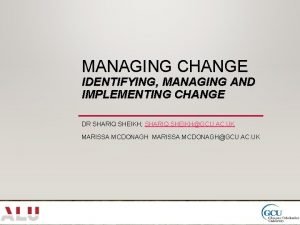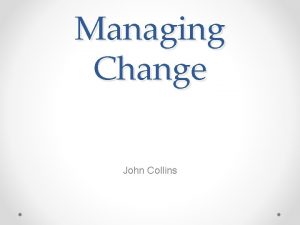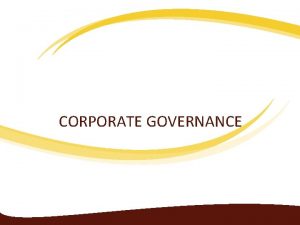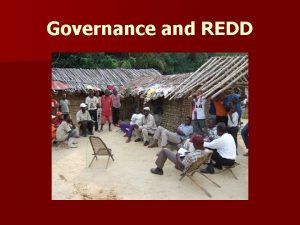THE GOVERNANCE OF CHANGE Ellie Acton Managing Consultant














- Slides: 14

THE GOVERNANCE OF CHANGE Ellie Acton – Managing Consultant

6 Biography Ellie Acton Managing Consultant Police Sector Specialist M: +44 (0)7800 617086 E: ellie. acton@rsmuk. com Ellie is a criminal justice professional with considerable experience prior to joining RSM. Since 2014, Ellie has been responsible for the effective spend of a £ 29 m budget for Restorative Justice Services commissioned by Police and Crime Commissioners. Ellie assisted PCCs to model their service requirements enabling them to tender for commissioned services or build a partnership model with existing resources. Previously Ellie worked for Cheshire Police where she had responsibilities including offender management (prolific and other priority offender scheme), establishing and managing drug testing on arrest in police custody and restorative justice both pre and post sentence. In addition she has experience in the investigation and prevention of hate crime.

Why is formal governance needed? Benefits of adopting a formal approach • Assurance that robust governance requirements are applied across the projects managed in your organisation. • Optimise your portfolio of projects. • Avoid many of the common failures in project and programme performance. • Improve relationships with staff, customers and suppliers. • Minimise risks to the organisation arising from projects. • Maximise the benefits to be realised from projects. • Assure the continued development of the organisation.

Project/programme governance Delegated authority Reporting Alignment to organisational objectives Decision gates Independent assurance For project governance, the quality and transparency of decision making is key.

Strategic Alignment Requirement • Engage with stakeholders to define the organisational purpose and objectives and how the project contributes. Why Important • Ensures the organisation is doing the right projects. • By right projects we mean those that are in the best interest of the organisation’s shareholders/stakeholders. • Enables performance to be measured. Considerations • You need to know your corporate objectives and their priority.

Delegating Authority Requirement • Define where decisions can be most effectively made. Why Important • Decisions should be made at an appropriate level within an organisation. • It should be clear who should make what type of decisions. • Everyone should be held to account by someone. Considerations § How does project governance integrate with corporate governance? § What types of authority can be delegated (hiring/buying/specifying)? § What’s the decision-making capacity of each layer? § Implications of group decision-making.

Reporting Requirement • Ensure transparency of decisions and actions and report their outcome. Why Important • An essential element of good governance is that those who are delegated authority should: ü report if there any conflicts of interest which may affect decisions and actions they undertake using the authority they have been granted; ü periodically report progress against the responsibilities delegated to them; ü report if they are unable to meet their responsibilities within the authority they have been granted. Considerations • • How does project reporting integrate with corporate reporting? What’s the minimum information that each layer needs in order to: ü Make a decision. ü Satisfy themselves the project is in control.

Independent Assurance Requirement • Verify through independent review. Why Important • Assurance enables transparency of decision-making and provides confidence to those granting authority that objectives can be met without them needing to intervene. • Without on-going assurance, those granting authority are solely relying on the self-reporting by those they have delegated authority to. Considerations • How does project assurance integrate with corporate assurance? • Be careful assurers do not become de facto approvers.

Decision Gates Requirement • Define the critical decisions that are reserved for the layer above. Why Important • Decision gates provide a final ‘fail-safe’ if the reporting element masks the true position and any issues or weaknesses are missed by the assurance activities. • Decision gates provide a periodic opportunity to check if the other governance elements are adequate or whether they need to be amended. Considerations • Distinguish between reviews and gates. • Assess impact of gate distance and frequency.

Practical Application – Mapping Governance Objectives Sponsoring Group (Investors) Programme Board (Directors) Programme Manager Project Managers Authority Reporting Reviews Gates

Good Decision Making To enable good decisions senior managers should be able to understand…. 1. How each project contributes to strategic objectives? 2. The likelihood of achieving the expected benefits? 3. The remaining cost of each project? 4. The earliest and latest completion time for each project? 5. What’s our total exposure to risk? 6. What’s our resource capacity? 7. The impact on the achievement of strategic objectives if any single project was cancelled, deferred, slowed down or accelerated?

Summary Benefits of adopting a formal approach • Assurance that robust governance requirements are applied across the projects managed in your organisation. • Optimise your portfolio of projects. • Avoid many of the common failures in project and programme performance. • Improve relationships with staff, customers and suppliers. • Minimise risks to the organisation arising from projects. • Maximise the benefits to be realised from projects. • Assure the continued development of the organisation.

QUESTIONS AND ANSWERS?

Contact Us Andy Murray Partner +44 (0) 7776 301602 andy. murray@rsmuk. com Ellie Acton Managing Consultant +44 (0) 7800 617086 ellie. acton@rsmuk. com We help organisations become more capable of delivering their bids, projects, programmes and portfolios effectively and efficiently. We help raise confidence among senior executives, stakeholders, regulators and shareholders that the time and effort invested will yield the desired results. Where needed we also provide advice and assistance in implementing the changes which are necessary to gain the capability you seek. http: //www. rsmuk. com/ https: //www. linkedin. com/company/rsm-uk https: //twitter. com/RSMUK

